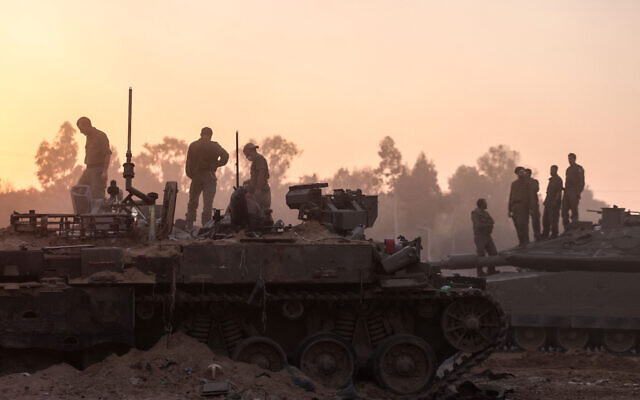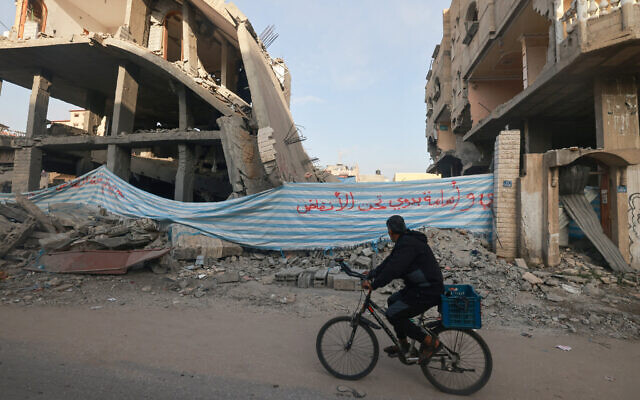



Israel may be open to restarting negotiations for the release of hostages held by the Hamas terror group in the Gaza Strip, reports suggested Monday, with Jerusalem apparently interested in a deal that would see the release of women and children remaining in captivity as well as the sick and elderly.
Hebrew-language media reports, citing unnamed Israeli officials, tread gingerly around the chances for a deal, nearly two weeks after a weeklong truce brokered by Qatar ended with Hamas’s refusal to hand over a final batch of female hostages and two young children who remain in captivity, and rockets fired by the terror group.
“The conditions are ripe for a framework in which it is possible to start to draft new agreements, from Hamas’s and Israel’s point of view,” a source told Channel 12 news, which first reported on the potential talks.
According to the channel, Mossad chief David Barnea and Maj. Gen. Nitzan Alon, the Israel Defense Forces point person on hostage talks, have been “directed to hear what the intermediaries are proposing,” but not to initiate proposals of their own.
“If the Qataris want to be heard, we will listen,” the unnamed source was quoted saying.
An Israeli official quoted by the Walla news site described the contacts as preliminary in nature, but said the next few days could see a resumption of talks.
According to the Haaretz daily, also citing an Israeli source, a line of communications remains open with Qatar, but neither side has offered any proposals yet.
Israel paused its Gaza offensive in late November for seven days as part of a deal in which over 100 hostages were released from Hamas captivity, where they had been held since being abducted on October 7 when terrorists rampaged through southern Israel, killing some 1,200 people, mostly civilians.
Another 138 people remain in captivity, including 15 female civilians and two children — Ariel Bibas, 5, and his 11-month-old brother Kfir.
Israel released 240 Palestinian prisoners in exchange and allowed more humanitarian aid to enter the Strip during the pause. The truce ended on December 1, with Israel accusing Hamas of reneging on its agreement to release 10 female hostages.
According to the reports, Israel has shifted its stance on demanding that all female civilians be released before it will consider exchanges for others, and is open to a deal for the release of sick, injured and elderly men as well as the remaining women and children. Reports described such a proposal as “humanitarian.”
The Saudi Elaph news site reported that a deal could also include the release of three senior Israel Defense Forces officers snatched on October 7.
According to Elaph, a deal could see Israel release 300 Palestinian prisoners, including 10 inmates serving long sentences. Among them would be Marwan Barghouti, serving five life sentences for his role in planning terror attacks that killed five Israelis during the Second Intifada.
Barghouti is popular among Palestinians and is widely seen as a possible successor to Palestinian Authority President Mahmoud Abbas.
The Israeli reports did not detail what Jerusalem may be willing to give up, but any deal would likely include a pause in fighting and a boost to the amount of aid Israel is letting into the beleaguered enclave.
The IDF has resumed pounding Gaza since the truce broke down, moving to take control of south Gaza hub Khan Younis and mopping up areas of the north. Prime Minister Benjamin Netanyahu and Defense Minister Yoav Gallant have both insisted that Israel’s military gains have heaped pressure on Hamas to pursue an agreement.
On Monday, Gallant said once-vaunted Hamas battalions in the terror group’s north Gaza strongholds of Jabaliya and Shejaiya were on the verge of collapse.
“I believe that if we increase the military pressure, there will be offers for more hostage deals, and if there are offers, we will consider them,” he said.
On Sunday, Qatar’s Prime Minister Sheikh Mohammed bin Abdulrahman Al Thani said mediation efforts to secure a new Gaza ceasefire and free more hostages held by Hamas were continuing, but blamed Israeli strikes for hampering chances for a successful outcome.
“Our efforts as the state of Qatar along with our partners are continuing. We are not going to give up,” he said, adding that “the continuation of the bombardment is just narrowing this window for us.”
According to Channel 12, chances for negotiations were being complicated by the fraying of Hamas’s leadership, with many said to be in hiding, and the deaths of some of those who previously served as intermediaries.
Over 18,000 people in Gaza have been killed since the fighting began, according to figures supplied by Hamas which cannot be verified and likely include those killed by Palestinian rocket misfires. Hamas health authorities do not differentiate between civilians and combatants, but Israel says it has killed some 7,000 members of the terror group.
On the Israeli side, 105 soldiers have been killed since the start of a ground offensive in Gaza.





